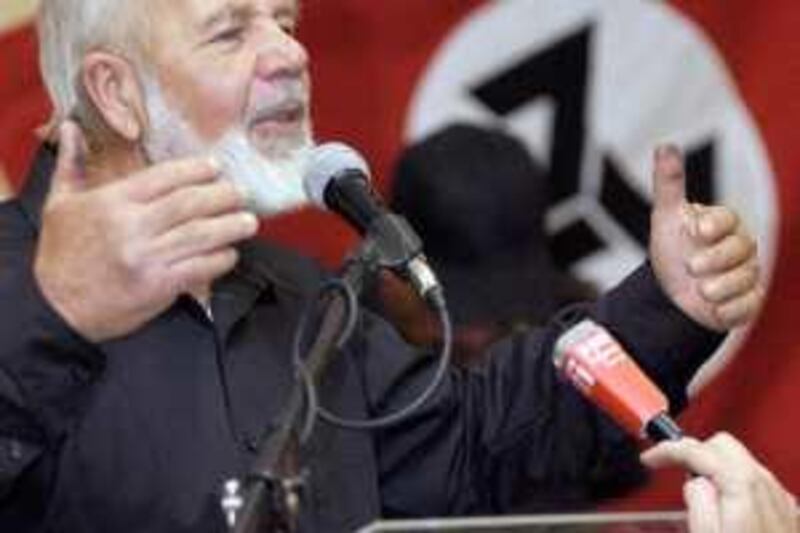JOHANNESBURG // When hundreds of Afrikaners gathered recently at the site of a battle where their forefathers had defeated an attack by thousands of Matabele tribesmen, the atmosphere was one of hatred and defiance. The event, held at the Vegkop memorial near Heilbron in Free State province, was intended to start a campaign for self-rule and against what they called the "yoke of black oppression". Speakers told the 300-strong crowd that Afrikaners, as the descendents of Dutch settlers are called, had the right to "liberation", and Frikkie Strauss, the secretary of the organising committee, reportedly declared that Afrikaners faced an existential threat that is a British conspiracy. "The ANC government is only the black glove on the white British fist," he was quoted as saying. "This ANC government was installed with only one purpose - to destroy our volk [people]." With whites making up about 10 per cent of the South African population, demands for Afrikaner self-rule are - 15 years after the advent of democracy - nowadays confined to a small minority. But the sentiments they reflect - and provoke - are nonetheless revealing of the bitterness that remains in some white quarters, and the acceptance of the new order in others. Among the speakers was Eugene Terreblanche, the leader of the Afrikaner Weerstandsbeweging (AWB) white separatist movement founded in 1973 by supremacists who considered the apartheid regime too liberal, and whose emblem is akin to a three-legged swastika. In the early 1990s, in the run-up to democratic rule, AWB's paramilitary wing raised fears of armed resistance by diehard Afrikaners, until it was humiliated when it invaded the nominally independent black homeland of Bophuthatswana in support of a coup. Pictures of one of its bearded members pleading for his life moments before being shot dead by a local policeman were published around the world, and militarily the AWB was instantly reduced to a spent force, even though its supporters maintain that the deaths were cold-blooded murders and it was undefeated. Even now, Mr Terreblanche - a notorious white supremacist who has served an unconnected prison sentence for assault and attempted murder - insists that whites must have a homeland of their own. "The white man in South Africa is realising that his salvation lies in self-government in territories paid for by his ancestors," he told the Mail and Guardian newspaper last week. He plans to unite more than 20 right-wing organisations into a single grouping to pursue a legal case for an independent republic at the International Court of Justice in The Hague, but refused to say how many members he has. "It is strategic," he said. "You do not disclose your spies in a cold war. The extremists' renewed demands have provoked an intense debate on the letters page of Business Day, the country's leading daily newspaper. Dan Roodt, one of the speakers at the Vegkop event, wrote that South Africa "is getting so unstable that organised genocide on the scale of Rwanda is a possibility not to be discounted too lightly". He claimed a "wall of hate" was aimed at Afrikaners by the state, and condemned the "tribal Johannesburg-English" of living in a "liberal dreamworld". "The tide of history, as is amply demonstrated by Algeria, the former Portuguese colonies and, of course, Zimbabwe, is against the continued presence of whites in Africa," he claimed. "We are all living under the sword of Damocles." Many Afrikaners, however, find Mr Terreblanche's campaign little more than paranoid hate-mongering. Henry Watermeyer, an information technology specialist - who has an Afrikaner surname - condemned Mr Roodt as a "rabid right- winger" who offered "negative, and to my mind destructive, rantings". "His particular brand of Afrikaner lost the war they declared on the majority of people in [South Africa]," he said. Contradicting Mr Terreblanche's claims is Pieter Mulder, the leader of the Freedom Front Plus (FF+), the main Afrikaner political party, which describes itself as "irrevocably committed to the protection and advancement of Afrikaner interests", who sits in the ANC government as deputy minister of agriculture. Last week Mr Mulder had an article published in newspapers across South Africa that said: "The Afrikaner has to make peace with Africa and the fact that he is in Africa." Officially the FF+, which took less han one per cent of the vote at the general election earlier this year, supports the creation of an autonomous territory for Afrikaners, but the tone of Mr Mulder's article emphasised Afrikaners' role within South Africa, and pointed out that the president Jacob Zuma, in contrast to his predecessor Thabo Mbeki, has said that Afrikaners have "come into their own right here". sberger@thenational.ae
Afrikaner fringe wants self-rule
Hundreds rally at battle site to start campaign against the 'yoke of black oppression' in South Africa.

Editor's picks
More from the national




